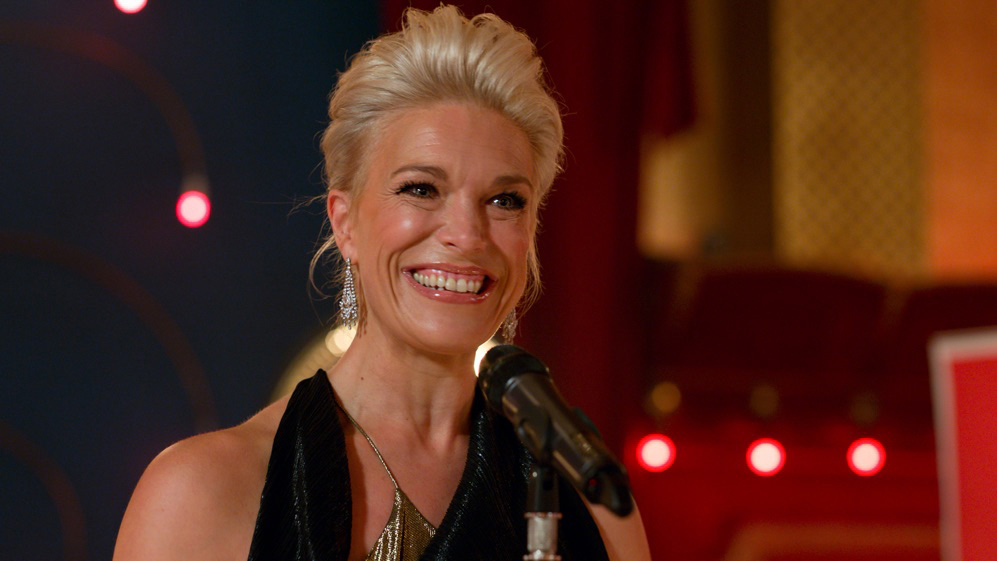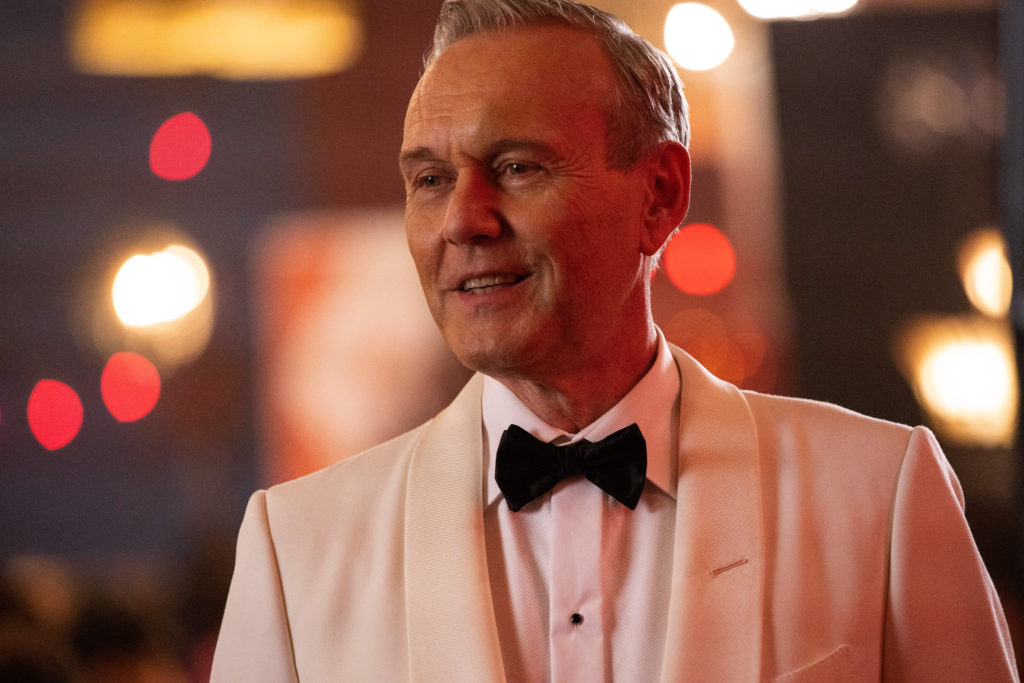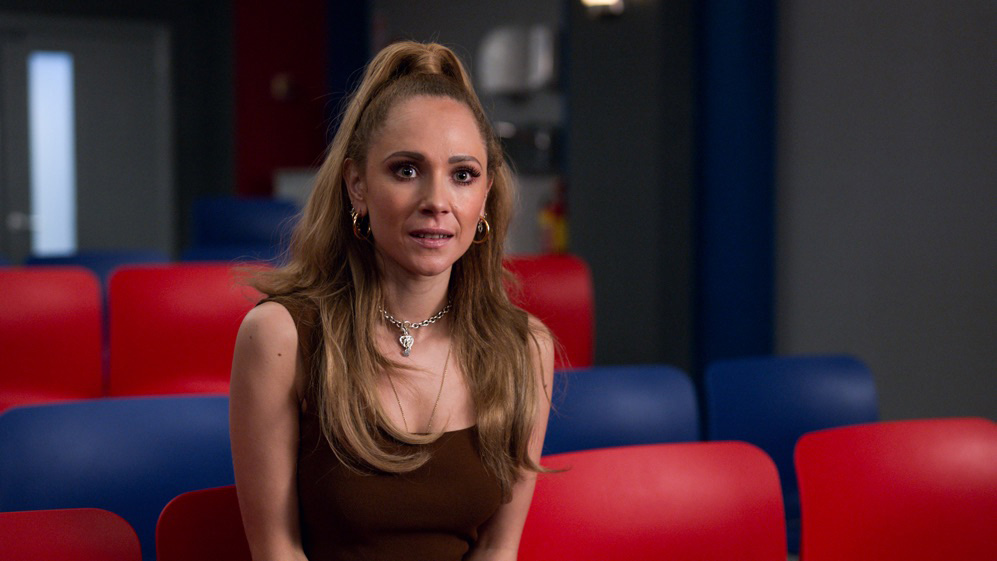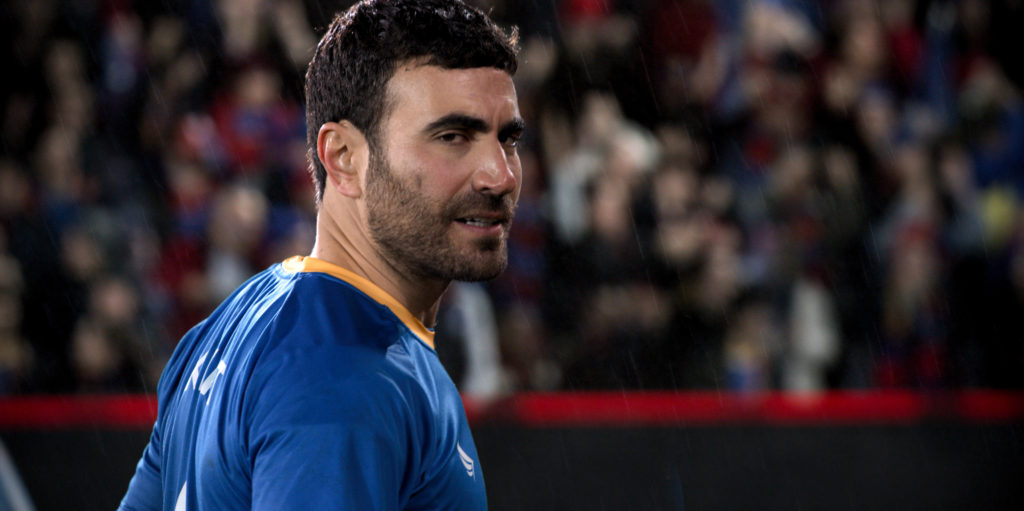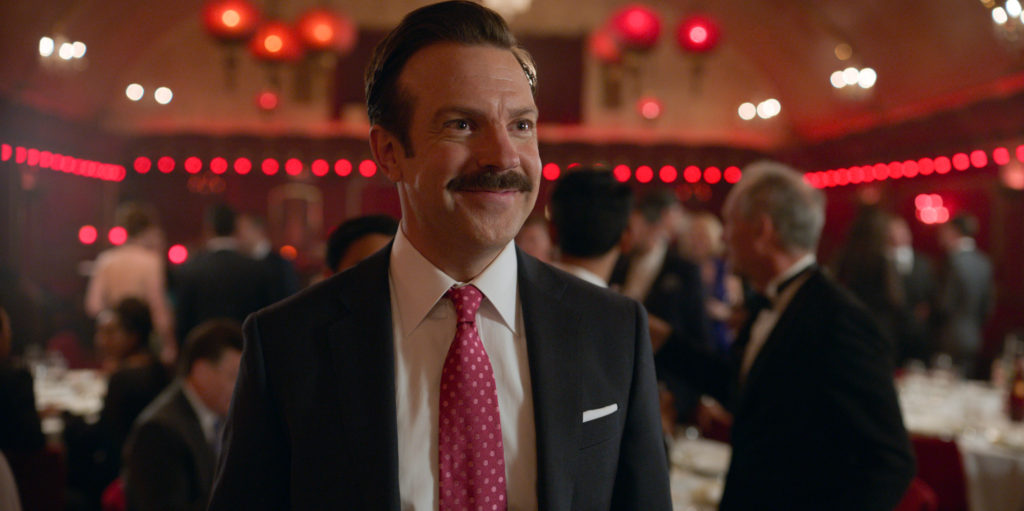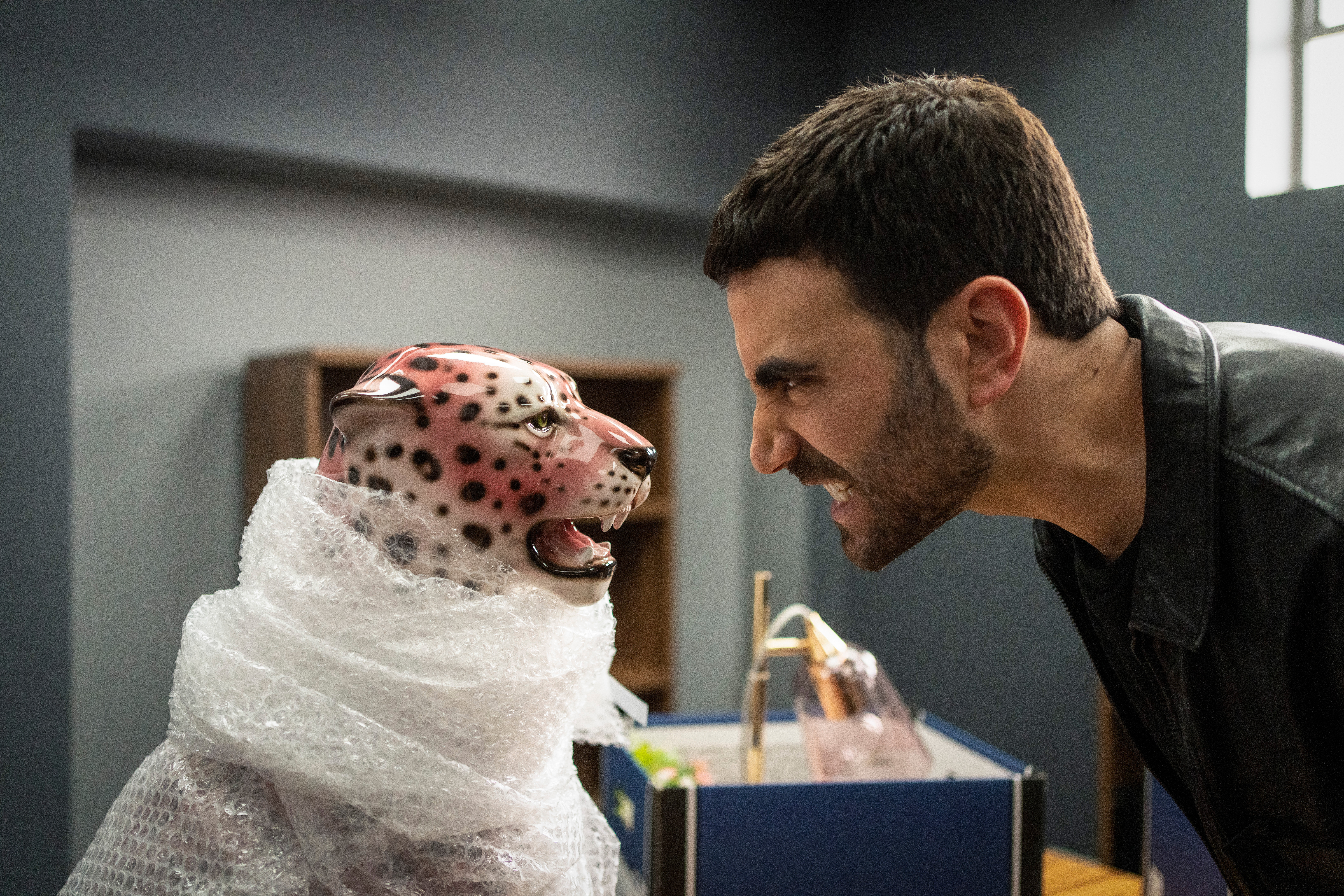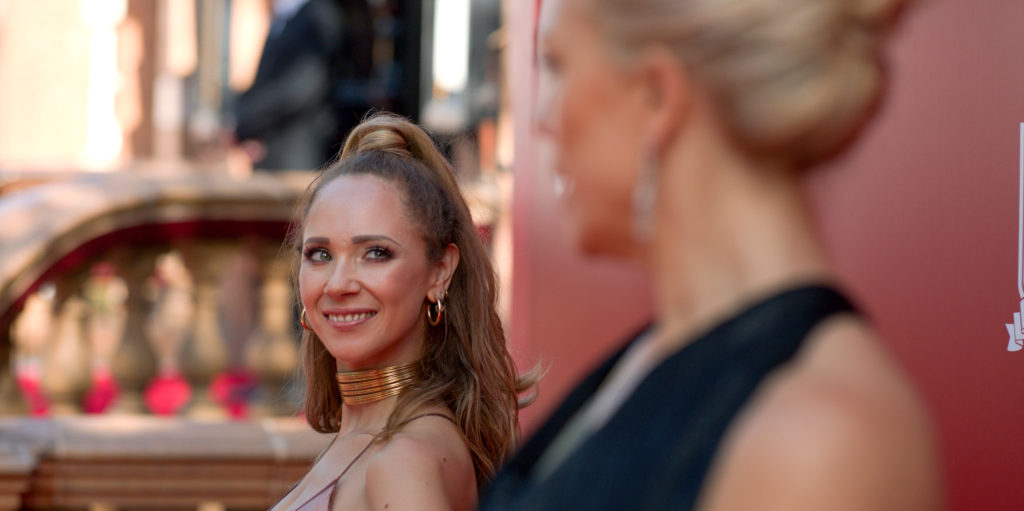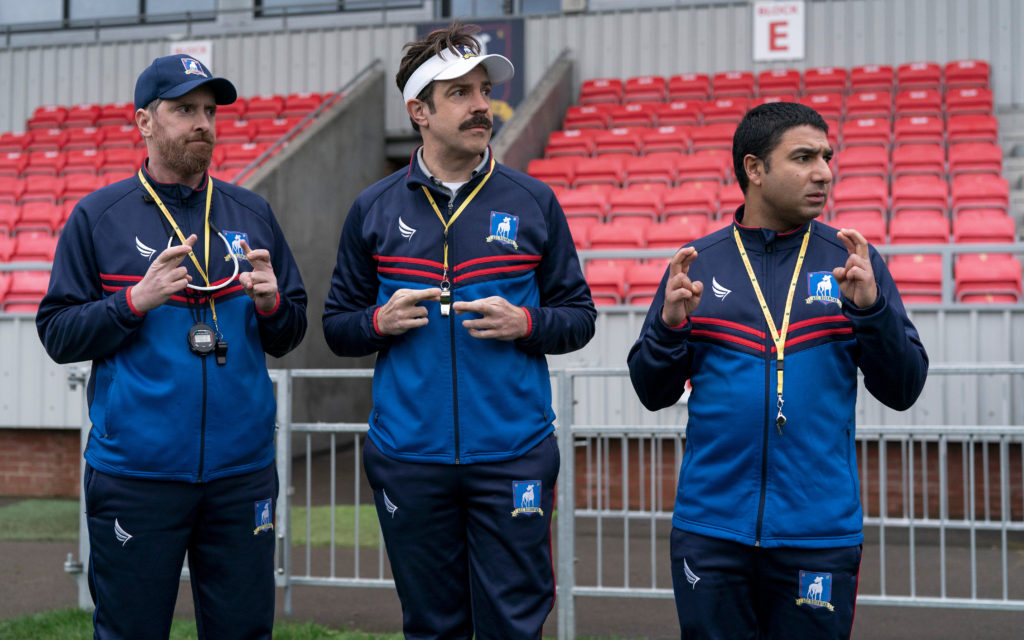In Gabrielle Basha’s MythBlast about Ted Lasso, Gaby wonders why she cries over a show about soccer. It’s an excellent question. I cry too. One reason, I think, has to do with how the series pulls the throne out from under the patriarchy, instead elevating a pantheon of mythic figures from mythology. And not just any pantheon. Ted Lasso’s emotional impact comes from combining the present-day world of English football with ancient patterns from Greek myth.
The Lay of the Mythic Land
Ted Lasso’s script plants clue after clue suggesting we interpret the show a) mythologically, and b) through Greek goggles. For example, one of the players says, seemingly out of nowhere, “Hey, do you like mythology?” In another episode Ted says, “Like the man says, you gotta follow your bliss” – the man clearly being the mythologist Joseph Campbell. And Greece keeps popping up in the dialogue:
~ “You can’t get a table at something called A Taste of Athens?”
~ “Where are we going?” “How about Greece?”
~ “Am I really about to eat something called Greek yogurt?” (ie Greek culture)
~ “And you leaving would be a betrayal on a level usually reserved for Greek mythology?”
Funny how these apparently throw-away lines are framed as questions. It’s as if the writers are saying, “Well? Do you see what we’re doing here?” Yes, writers, we do!
So ok. Ted Lasso and Greek myth, got it. But what divinities are we talking about? Well, the show’s Greek gods and goddesses build on core archetypes like Sovereign, Lover, Warrior, and Magician. In Greek terms, our Sovereign is Hera, queen of the gods. The Lover is Aphrodite, goddess of love. The Warrior is Ares, god of war. And the Magician is Hermes, the divine messenger and guide of souls — the cunning god of communication and change, tricks and transformation. But they all have different names in the Lasso universe.
When the show begins, Hera, who the show calls Rebecca, has taken the radical step of liberating herself from a miserable marriage to philandering Zeus, here named Rupert, who still can’t stop chasing nymphs. But Rebecca, like Hera, remains trapped in her own personal prison of jealousy and revenge.
Meanwhile the goddess of love, Aphrodite, or Keeley in the show, is stuck in compulsive, youth-obsessed sexuality and her failed attempts to achieve fame. The god of war Ares, or Roy, is facing a wasteland of middle age as he keeps on fighting merely to fight, seemingly out of nothing but habit and resignation.
Into this situation bursts Hermes, the trickster-messenger-magician god in the form of Ted himself, who believes wholeheartedly in the magic of everyone he meets even though no one believes in him — or in anything else.
Goddesses Will Be Goddesses
One of the main goddesses is Keeley-Aphrodite, the ebulliently sexual influencer who electrifies the locker room whenever she pops in for a quick epiphany.
Like many of her ancestor goddesses, Keeley’s totem is feline: she wears a lion costume (after a long conversation about lion powers), and the ceramic pink cheetah in her office named Trixibelle simultaneously guards and reveals Keeley’s true nature.
Joyfully raunchy at every opportunity, Keeley-Aphrodite consorts with the pretty boy Jamie Tartt (a beautiful young Adonis who must die to his own ego), until she gets past her own arrested development and finds her soul’s true partner in Roy-Ares. Eventually she even steps into her own Sovereign nature as the CEO of her own company.
But the primary goddess is Rebecca-Hera, the regal but embittered divorcée.
All Hail Queen Rebecca
In Greek myth, Hera is the queen of the gods. But these myths, written at least in part for the training and conditioning of women, portray Hera as a jealous, vengeful, humiliated wife, helpless to do anything about Zeus’s continual dallying with nymphs and mortals.
Similarly, Rebecca’s ex-husband Rupert is a filthy rich socialite who continually dates nymph-like mortals. Evidently immune to consequences, Rupert stands in not only for Zeus but for the whole idea of a single male god who rules over all. And Rebecca says Enough. In the divorce settlement, she receives the football/soccer club, and under her leadership, a new era begins. Just as Hera is the queen of the gods, Rebecca becomes queen of the team.
The first time Ted meets Rebecca, he brings her homemade cookies/biscuits (ambrosia) which he places on her desk (altar). This becomes his daily ritual. Rebecca accepts his offerings reluctantly at first, but soon she requires that divine sustenance delivered to her Olympian office shrine, which sits high above the earthy pitch. Occasionally she shouts down to the field from on high in her booming voice, and sometimes even descends to the locker room in stunning stilettos and a cloud of perfumed glory.
So while Rupert’s time is waning in the universe of the Richmond football club, the future belongs to Rebecca, whose supernatural wealth, beauty, and presence command attention in any room. At a press conference a journalist challenges her, and she cows him with her ruthless logic and a withering glance from her dizzying height. When she shows Nate and Keeley how to be assertive, they gape at her dazzlement in stunned silence. When Rebecca buys drinks for the whole pub and when she takes the karaoke stage, the mere mortals around her can’t help but whoop with joy in the orbit of her bounty.
In one of Ted’s lowest moments, when he has a panic attack in a shadowy alley, who appears at his side as if summoned? Rebecca. The Goddess. She knows when he needs her and she materializes. She holds him as he finds his way back. Her hands anchor him and her voice guides him.
A New Goddess Attitude
In the first minutes of the first episode of Ted Lasso, Rebecca kicks misogyny to the curb in the form of the previous coach. In another episode, Ted says, “If God had wanted games to end in a tie, She would not have invented numbers.” Another time we learn that Rebecca’s assistant Leslie Higgins is named after his mother. This makes him a “feminine junior,” to which Ted responds, “Cool.” Coach Beard reads The Da Vinci Code and coyly comments that he can’t put it down. God characters elevate goddess characters, wholeheartedly and at just the right moments. Goddesses adore all this. Ted Lasso and Greek myth make mortals who sense themselves to be made in the image of goddesses (so to speak) feel like they don’t have to fight just to exist.
Nor do Rebecca and Keeley play out the tired old madonna-whore complex we’ve been suffocating under for centuries. Rebecca and Keeley ace the Bechdel test with extra credit through the radical act of adoring each other. They hang out together, laugh together, help each other. They gracefully receive each other’s honesty, with no offense taken or intended.
The Changing of the Gods
One one level, the whole team are warriors for the goddess, but individual deities do emerge from the pack of players. Dani Rojas is Eros, the life force who bursts onto the field fueled by pure passion, leaping into the arms of other players, wrapping his legs around them and shouting, “Futbol is life!!!” Jamie Tartt is Adonis, as already mentioned, and Dionysus appears in every bottle of champagne, glass of wine, whiskey highball, and pint of ale.
But one of the most important gods in the show is Ares in the form of Roy — legendary player/warrior, besotted soulmate of Keeley-Aphrodite. At the beginning of the show, Roy’s passion is twisted up in a knot of anger, but he learns to channel that pent up power. Doing battle with his own unhelpful patterns, he first moves past jealousy, then he obeys Keeley (which drives her wild with desire), gives her the space she needs, and sees and honors her success on her own terms, apart from her relationship with him. Eventually he even embraces his arch-enemy Jamie-Adonis. Roy becomes a warrior of the heart.
But how does all this transformation happen? Because a Magician arrives in the form of Ted Lasso, who plays a modern day Hermes.
Guide of Soccer Souls
As this blog has discussed before, Hermes is the messenger of the gods, carrying divine communications between upper realms and lower, and he’s really fast in his magic winged sandals. The talkative god of travel and trickery, he serves as the guide of souls. He occupies the in-between, thresholds of all kinds, the neither-here-nor-there. He’s one of the gymnastikoi, or gods of the gymnasium.
Ted Lasso, likewise, flies from America to England, really fast and high over the ocean, to take a job as a coach for a sport he knows nothing about. A perpetual traveler, he makes himself at home in England without actually having a home there. He wears conspicuously bright sneakers as he sprints around the pitch ahead of the other players, and as he bounds up into the stands during a game to carry a message to Rebecca. He moves easily between the upper realm of Rebecca’s office, the surface world of the pitch, and the underworld of the locker room, where he even leads an exorcism of old ghosts, sending them back to the underworld where they belong. Funny, talkative, and weirdly charming, Hermes-Ted sees everything that happens, at and below the surface.
Most of all, Ted takes a trickster’s approach to coaching, which is to say, an indirect approach. His first step is to throw a surprise birthday party for the homesick Nigerian player Sam. Then Ted fixes the team’s showers, which had been dribbling like they needed a prostate exam (according to him), thereby restoring virility and strength to the locker room. He leaves gifts of books in the lockers personally chosen for each player. At a clutch moment, he benches his star player. His trickery keeps everyone guessing, always. You never know what he might do next, so you have to stay alert.
The Messenger is the Message
Ted’s full name is Theodore, from the Greek (of course) and it means divine gift. And he does give gifts. Parties, books, biscuits, belief — he distributes treasure of many kinds when the people around him need it most.
In a true Hermes move, Ted fools everyone into thinking he’s an idiot — vapid, ridiculous, empty — but what he’s really empty of is ego. And that’s the kind of emptiness that’s big enough to hold all the other characters in its embrace. That’s how he works his magic of guiding souls toward their best selves.
Ted also take nothing personally. He knows that people aren’t terrible, they just do terrible things. He sees their inner shine before they do. His job is to help them get out of their own way so they can beam at peak wattage. To do that, he stays on the sidelines working his indirect magic.
He focuses the team on winning at life, being their best selves on and off the field. He helps them find their strength, feel supported, support others, and step outside their petty, gnarled little egos. Gradually at first, and often falling right back into ego, they begin to do their joyful work. And it turns out that winning at life helps win at the game which helps win at life.
Ted Lasso also demonstrates how to honor the Goddess. In fact, Ted’s default is to treat pretty much everyone like they’re as sacred as the Goddess. Then they remember that they are sacred. And then they change. The show isn’t even about Ted as much as it is about how everyone else changes in response to him.
When Ted first arrives at the pitch, he crouches down and reverently touches the grass. The pitch is the temple of the sacred game, where devotees experience the divine. They feel wonder, amazement, awe, and all the emotions that accompany trying, failing, winning, losing. Ted Lasso and Greek myth together illustrate that play is sacred, and that the sacred can be playful. If the pitch stands in for the field of life, then the point is to enter the temple and play.
Messing Up Better
Ted’s job title is coach, which is interesting in light of the popularity of personal coaching. It’s like we hunger for our own soul guides. But still, why does Ted Lasso make us cry?
During halftime, when Ted tells the team, “Fellas, we’re broken — we need to change,” he is speaking for himself, for the players, for the team as a whole. He’s also speaking for many, many other men, and speaking to the world on behalf of men. Ted is nothing if not an agent of change, but more than subverting mere toxic masculinity, this show subverts toxic divinity.
Ted Lasso and Greek myth conjure a world of post-patriarchal archetypes, in which the characters work through their issues more than they act them out. It’s a femme-friendly, sex-positive, heart-awakened world, and I’m using the word “femme” to mean everything that patriarchy typically reviles. Things like feelings. Friendship. Fashion.
It’s difficult to convey how moving it is to step into a world where the Goddess reigns. In this atmosphere, those of us who have ever been shamed, rejected, or attacked for being or liking anything that the patriarchy condemns feel shock, relief, joy, gratitude. Goddess-starvation is a real condition, and Ted Lasso is nourishment for the famished.
In the world of Ted Lasso, everyone messes up, but apologies come easily and wholeheartedly, and are received easily and wholeheartedly. These characters are more interested in relationships than in their own wounds. And this world isn’t fantasy. It might be fiction, but its miracles do not depend on aliens or technology or wizard powers. This magic is actually available every day, to everyone. The only cost is our illusions and resentments.
Every character’s issues point precisely to their areas of potential. Their strengths just got twisted up and distracted by all the usual ego fears. Take those away, create a safe space, and people flower. They mess up, own up and then they have a better chance of messing up better next time.
Wonder Abounds
So the mythological 1-liner for Ted Lasso is as follows: Hera finally dumps Zeus and then calls Hermes in to help the fractured pantheon restore itself.
Through the muck and muddle of daily life, Ted Lasso and Greek myth lead us into experiences of awe — a towering goddess, a stunning win, the daring, defiant feeling of belief. Believe is Ted’s watchword, and it’s a very spiritual term. But he’s not talking about believing in nonsense or lies. He’s talking about believing in yourself, believing in others, believing that unlikely things (miracles) can and do happen.
The shock of Ted’s arrival wakes everyone out of a torpor in which they had been acting out very, very old dramas — dramas that lie at the root of cultures that derive from European traditions. If these characters can change, then so can we. If their patterns are not set in stone, then neither are ours. Ted Lasso uses Greek myth to dismantle our psychological and societal prisons.
What’s really wonderful is that we see the main characters lead with one archetype — Sovereign, Lover, Warrior, Magician — and then grow into another. They become more of themselves, more whole, more complete. Rebecca becomes Lover as well as Sovereign. Keeley becomes Sovereign (CEO) as well as Lover. Roy becomes Lover as well as Warrior. What might Ted become in addition to Magician? That’s the big question for Season 3.
